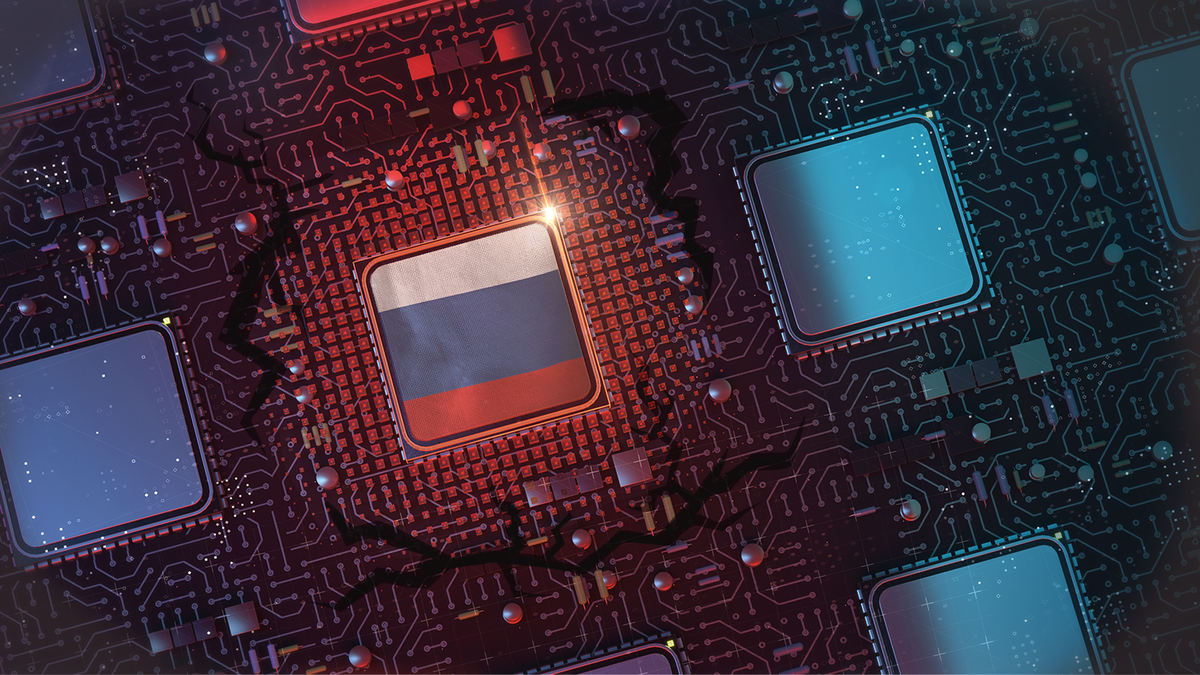You can also listen to the article in audio version.
–
“Without personal computers, the Internet and mobile phones, the life of a modern person is absolutely unimaginable. Contrary to popular belief, we do not owe these inventions to the West. They were all made in the Soviet Union! ”
–
With such an ambitious claim the pro-government Russian website Pravda.ru arrived on February 28, four days after the start of the Russian invasion and two days after the onset of severe Western sanctions.
–
It is not difficult to guess the goal of such an article. To offer a surprising historical parallel and reassure readers that Russia will do without the West in terms of technology. “We are not afraid of American sanctions, we will do without your tweaks,” he reports viral video from the beginning of March, his Russian father disposes of an Apple iPad tablet with a hammer.
–
However, real data suggest the exact opposite. Not only is Russia’s technology sector not a world leader, but with the onset of sanctions, the dream of Russian independence has moved even further away.
–
Russian chips 15 years behind the competition
Russia is happy presents as a leader in the field of sophisticated, electronically charged weapons and one of the largest arms exporters in the world. However, such a “smart weapon”, like a modern car, tablet laptop or smart phone, needs advanced computer integrated circuits to function. That is, the chips that have not been available around the world for the last year.
–
Russia has some of its own chip production. The largest Russian chip manufacturer – Mikron – ale according to experts lags behind the world top by about 15 years. The most advanced Russian plant works with 65-nanometer circuits, which corresponds approximately to the level of 2006.
–
Mikron – the largest chip plant in Russia.
For comparison – the Taiwanese manufacturer TSMC produces five-meter chips and works on three-meter circuits. A lower number is better in this case, allowing you to place more transistors on a small chip more efficiently, thus increasing performance many times and reducing power consumption.
–
What do Russian chips look like in action? The Russian youtuber Stanislav Vasilyev tried it, for example, when testing the borrowed prototype of the first one purely russian laptop Bitblaze Titan built on the Russian processor Baikal M: “For fans of curiosities or for fans of all things Russian, it’s definitely a good buy…”
–
Youtuber couldn’t help but laugh when he saw the insides of a Russian laptop.
And we still have to take into account that the Baikal processor used is of Russian design, but it is not manufactured in Russian factories. It uses a 28-nanometer architecture and, according to Russian plans, is supplied by the aforementioned Taiwanese manufacturer TSMC. This company at the same time she statedthat will respect Western sanctions, which probably means the interruption of these supplies as well.
–
No one achieved chip independence
Such cross-border cooperation is by no means exceptional or shameful in the production of chips. Maybe current world leader – M1 chips – are the result of cooperation between many companies. The American company Apple designed the chip and integrates it into its products. Taiwanese manufacturer TSMC manufactures M1 chips. And it uses technologies developed by the Dutch company ASML.
–
The Dutch company ASML pays for an innovator in the field of chip production. She came up with, for example, extreme ultraviolet lithography (“EUV Lithography”).
Chip production is simply a complex, interdisciplinary and lengthy process. Licenses, patents, designs, simulations, integrations, robotics or advanced materials processing come into play. So not only Russia, but no country in the world has the ability to fully cover its technological needs from its own resources.
–
If Russia cut itself completely away from the world now, it would technologically sink to the bottom.
–
“Europe is not self-sufficient in electronics either. Neither America nor China, not even Taiwan, where 25 percent of the world’s chip production is concentrated, “emphasized Jiří Jakovenko from the Department of Microelectronics at the Faculty of Electrical Engineering of the Czech Technical University in Prague. “They make chips in Taiwan for the best processors in the world, but they don’t need to make other chips.” There are tens of thousands of different types of chips, and no country produces everything it needs.
–
The global shortage of chips, by the way, probably due to the Russian invasion deepens. Russia and Ukraine are among the most important neon exporters. This rare gas is used, among other things, in the production of chips, and its increase in price will again lead to the complication of a complex global production chain.
–
The poor economy received another blow
The world’s great powers are trying to reduce the need to import chips from abroad. At least since 2021, the USA and China have been working hard. “Chips, like batteries or high-speed internet, are infrastructure,” said US President Joe Biden. in April 2021. “We have to work on the infrastructure of the present, not build the infrastructure of the past.”
–
But Russia is no economic power. Measured by gross domestic product from 2020, it is only in 11th place, and when calculated per capita, the comparison is even worse. (see chart below where you can browse).
–
“Even hesitant China will calculate that the probability that Russia will win the war and the Russian economy will not collapse at the same time is extremely low.” writes economist Tomáš Sedláček. According to him, China will therefore be very careful and will not rush into helping Russia.
–
These are all immediately visible damage. But an even greater impact – not only in technology – is expected as a long-term indirect impact of sanctions.
–
The brain drain will be huge
“We are all dependent on each other, everything is intertwined,” concludes Jakovenko from CTU. “If we were to be independent of others from tomorrow, no one would give it. If Russia cut itself off from the world now, it would technologically fall to the bottom. “
–
The question is whether Russia can still avoid this fall at all. So far, we have talked about technology in terms of the components that are at the heart of modern electronics. In such a metaphor, the brain of electronics would be human brains. Without highly qualified hardware and software experts, no state can think of any technological independence or thought.
–
The negative effects of isolation will affect Russia much more than the international community.
–
Imagine you are a software specialist living in Moscow or St. Petersburg. In February, you didn’t really miss anything in Russia. You could use the same laptop and the same software tools as your colleagues in Japan, Germany or the USA. You communicate with programmers from all over the world on a daily basis and collaborate on various projects. You can sell whatever you come up with anywhere in the world, either on your own or through multinational companies operating in Russia.
–
It’s a month later and suddenly everything is different in your professional life. Multinational technology companies are leaving Russia. You already know that you will not be able to buy the latest in Russia iPhone and probably not a laptop. Parts of the Internet are already inaccessible to you without advanced tools, and there is even talk of the possibility of full cutting off the Russian Internet from the global network. Even the communication platforms you use to work with colleagues around the world are slowly disappearing.
–
In such a situation, it is understandable that just educated and skilled workers Russia they leave en masse. The exodus of technicians, scientists or programmers is a logical answer to the real and perceived isolation of Russia. If their situation allows them to emigrate, these professionals will find it relatively easy to find work in the field and abroad. After all, they have already communicated with foreign colleagues in English, so even the language barrier will not be an obstacle for them.
–
“International cooperation and communication is absolutely key to scientific progress,” agrees David Honys from the Academy of Sciences of the Czech Republic. “That is why I find the current isolation of Russia and Russian science and its separation from the international research area very unfortunate.”
–
According to him, the negative effects of Russian isolation will affect Russia much more than the international community. The story of Russia’s technological independence may be believed by people who blindly support Russian President Vladimir Putin at all times. But experts in science and technology know that in isolated Russia they will not reach the world’s cutting edge.
—


